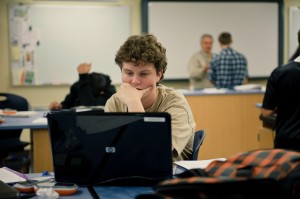
Over the past few weeks, I've been hearing from frustrated teachers about surprising websites their schools block -- everything from National Geographic to Skype. One even wrote in to say that CommonCore.org was blocked.
A few readers questioned the judgment of teachers who use their own mobile devices to allow their students access to blocked sites. One reader, identified as Cwells67, goes so far as to claim: "If we do not block inappropriate sites 'to the extent practicable,' meaning 'if you can block inappropriate sites, you are legally bound to block them,' we will lose ALL FEDERAL FUNDING."
To clear up some of the confusion around these comments and assertions, I went straight to the top: the Department of Education's Director of Education Technology, Karen Cator.
Cator parsed the rules of the Childrens Internet Protection Act, and provided guidance for teachers on how to proceed when it comes to interpreting the rules. To that end, here are six surprising rules that educators, administrators, parents and students might not know about website filtering in schools.
- Accessing YouTube is not violating CIPA rules. "Absolutely it’s not circumventing the rules," Cator says. "The rule is to block inappropriate sites. All sorts of YouTube videos are helpful in explaining complex concepts or telling a story, or for hearing an expert or an authentic voice -- they present learning opportunities that are really helpful."
- Websites don't have to be blocked for teachers. "Some of the comments I saw online had to do with teachers wondering why they can’t access these sites," she says. "They absolutely can. There’s nothing that says that sites have to be blocked for adults."
- Broad filters are not helpful. "What we have had is what I consider brute force technologies that shut down wide swaths of the Internet, like all of YouTube, for example. Or they may shut down anything that has anything to do with social media, or anything that is a game," she said. "These broad filters aren’t actually very helpful, because we need much more nuanced filtering."
- Schools will not lose E-rate funding by unblocking appropriate sites. Cator said she's never heard of a school losing E-rate funding due to allowing appropriate sites blocked by filters. See the excerpt below from the National Education Technology Plan, approved by officials who dictate E-rate rules.
- Kids need to be taught how to be responsible digital citizens. "[We need to] address the topic at school or home in the form of education," Cator says. "How do we educate this generation of young people to be safe online, to be secure online, to protect their personal information, to understand privacy, and how that all plays out when they’re in an online space?"
- Teachers should be trusted. "If the technology fails us and filters something appropriate and useful, and if teachers in their professional judgment think it's appropriate, they should be able to show it," she said. "Teachers need to impose their professional judgment on materials that are available to their students."
Here's the full transcript of my Q&A with Karen Cator.

